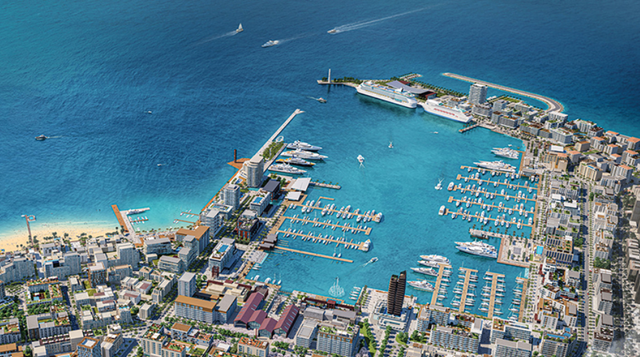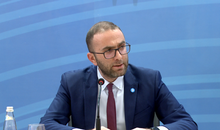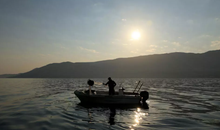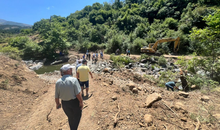
 Flash News
Flash News
Ceno Klosi with over 800 stolen votes, Balluku finds the reason is the tiredness of the counters
"Fast & Furious" in the former Block, police chase an Audi Q8, 4 cars collide
Car hits two tourists on a motorcycle in Fushe Arrëz, one of them dies
Serious accident in Thumanë, one dead, 3 injured
Durrës Court suspends the director of Pre-University Education from duty
New Commercial Port in Porto Romano, the company did not pay the fee, the Public Procurement Commission does not accept the complaint

The appeal for one of the highest-cost tenders, such as the one for the New Commercial Port in Porto Romano, was dismissed by the Public Procurement Commission because the company did not pay the respective fee that applies in these cases.
In a decision issued a few days ago, the KPP details the progress from the procurement phase of the contract "New Integrated Commercial Port of Durrës in Porto Romano Phase 1 with a limit fund of 399 million euros" to the rejection of the appeal. Specifically, one of the five companies participating in the procedure in question and not qualified, Jan De Nul nv, has claimed that the disqualification was not fair.
The Bid Evaluation Committee argued that it had failed to find a specific certificate in the company's documents.
"The reasons for the disqualification are the failure to find, in the submitted documentation, the certification of the works carried out for the project "NRL – Echangeur & Digues; La Nouvelle Route du Littoral – La Réunion" specifying the percentage of participation in the project of each participant, given that the project was carried out by a Joint Venture (JV). Also, the authority announces that the Bid Evaluation Committee (KVO) did not find in the documentation, the evaluation form or the act of approval and/or the certificate of acceptance," the Commission would argue.
After this, the association of economic operators represented by Jan De Nul nv filed a complaint with the KPP but did not make the payment that must be made in each case to the KPP's account.
After several days of requests and coordination with finance or the treasury branch and banks, it turned out that the payment was not made.
"The complaint is made according to the relevant form, where the name and address of the complainant are noted, the reference to the specific procedure and the legal basis, where the complainant claims the violations, the payment of the complaint fee, accompanying it with the relevant documentation and evidence, which he believes supports his complaint. The above-mentioned elements are necessary for the review of the complaint. The complainant is obliged to attach to the complaint the bank document that confirms the payment of the relevant fee for the complaint" the KPP quotes the procurement law, underlining that the payment is a necessary condition for the complaint to be considered.
The PP cites that it is established that the complainant has not paid the financial fee of the complaint in accordance with the provisions of point 2 of Article 111 of Law No. 162/2020 "On Public Procurement", as amended, thus failing to meet one of the necessary elements for the review of the complaint.
In the end, it decided not to accept the complaint and allow the Port Authority to continue with the procedure in question.
Five companies participated in the tender for the new Integrated Commercial Port in Porto Romano.
This was the second tender procedure after the failure of a previous procedure.
The need for a new commercial port came after an agreement to transform the current port into a marina and residential project with the company of Emirati investor Mohamed Alabbar. The Durrës Yacht Marina project has been underway for some time now, with preliminary auction sales for unfinished construction.
The relocation of the Port of Durres to another location led the government to decide on its development in Porto Romano. Among the two alternatives for the development of the new Port, the C2 model was chosen. This model envisages a port that is developed on the coast and not the C1 variant that envisages development at sea.
At the end of 2022, during the presentation of the project, it was highlighted that the project has a significant cost and will require the commitment of budgetary funds, Port Authority funds, grants, but also the private sector, thus leaving the possibility of PPP open. At least 46% of the financing will be provided by the government and 54% by the private sector./ Monitor
Latest news





Lufta në Gaza/ Pse Netanyahu do vetëm një armëpushim 60-ditor, jo të përhershëm?
2025-07-02 21:56:08
US suspends some military aid to Ukraine
2025-07-02 21:40:55



Methadone shortage, users return to heroin: We steal to buy it
2025-07-02 20:57:35
Government enters oil market, Rama: New price for consumers
2025-07-02 20:43:30
WHO calls for 50% price hike for tobacco, alcohol and sugary drinks
2025-07-02 20:41:53







Israel agrees to 60-day ceasefire in Gaza, but many unanswered questions remain
2025-07-02 18:35:27
The weather in Germany is going "crazy", temperatures reach 40°C
2025-07-02 18:22:21

"Fast & Furious" in the former Block, police chase an Audi Q8, 4 cars collide
2025-07-02 17:59:25
"Birth on a tourist visa? US Embassy warns Albanians: This is prohibited!"
2025-07-02 17:48:16


BIRN: Fier recount reveals vote trafficking within open political party lists
2025-07-02 16:57:19

CEO and former director of 'Bankers Petroleum' arrested in Fier
2025-07-02 16:40:42
Car hits two tourists on a motorcycle in Fushe Arrëz, one of them dies
2025-07-02 16:33:23



Fire at the Elbasan Incinerator Landfill, Prosecution Launches Investigations
2025-07-02 15:34:54
What you need to know if you travel to a country with active volcanoes
2025-07-02 15:33:03



EU proposes 90% reduction in greenhouse gases by 2040
2025-07-02 14:50:23
Europe is burning from the heat / Italy and France are on maximum alert
2025-07-02 14:36:52

Moscow's contradictory statements: Is the friendship with Vučić breaking down?
2025-07-02 14:21:05
'I lost my battle': Sea warming is killing fishing in Albania
2025-07-02 14:08:35
Sekretet kimike që ndihmojnë në mbajtjen e mjaltit të freskët për kaq gjatë
2025-07-02 14:01:26

Denmark makes historic decision to make military service mandatory for women
2025-07-02 13:44:33
The appeal of the GJKKO leaves former judge Pajtime Fetahu in prison
2025-07-02 13:30:20
Productivity losses could reduce GDP by 1.3% as a result of extreme heat
2025-07-02 13:21:04
He abused his minor daughter, Zamir Meta is left in prison
2025-07-02 13:04:04

Waste burning in Elbasan, Alizoti: They are poisoning people and stealing money
2025-07-02 12:48:39
Civil disobedience continues in Serbia, dozens of people detained
2025-07-02 12:40:32
Rama's government was born under the sign of garbage and will end like this
2025-07-02 12:28:09
Water prices increase in the municipalities of the Elbasan region
2025-07-02 12:13:38
Civil disobedience continues in Serbia, what is happening in Belgrade?
2025-07-02 12:07:44
Serious accident in Thumanë, one dead, 3 injured
2025-07-02 11:54:42
Durrës Court suspends the director of Pre-University Education from duty
2025-07-02 11:49:27
Plenary session on Thursday, what is expected to be discussed
2025-07-02 11:36:43
Europe is burning from heat waves/ What is the 'thermal dome' phenomenon?
2025-07-02 11:26:25
Wanted by Italy for murder, 45-year-old arrested in Vlora
2025-07-02 11:19:31
Fire situation, 28 fires reported in 24 hours, 2 still active
2025-07-02 11:13:20
"Buka" file, preliminary hearing for Ahmetaj postponed to July 17
2025-07-02 11:03:30


Baçi: Belinda Balluku and Ceno Klosi, the most dangerous "gangs" in Fier
2025-07-02 10:32:09
Zamir Meta, suspected of sexually abusing his daughter, arrives in court
2025-07-02 10:21:33

Trump: Israel has agreed to a 60-day ceasefire in Gaza
2025-07-02 10:01:55
Fire continues at Elbasan landfill
2025-07-02 09:51:13

Dates to note during July, important events will occur
2025-07-02 09:31:45
The hearing for Jorgo Goro's claim is postponed
2025-07-02 09:24:19



Foreign exchange, the rate at which foreign currencies are sold and bought
2025-07-02 08:42:31

52% of pensioners did not receive full pension in 2024
2025-07-02 08:27:18
Horoscope, what do the stars have in store for you today?
2025-07-02 08:13:36
Hot weather, Wednesday brings high temperatures
2025-07-02 07:59:16
Morning Post/ In 2 lines: What mattered yesterday in Albania
2025-07-02 07:46:15
Heatwave sweeps across Europe, Spain and England record hottest June ever
2025-07-01 22:57:41






Golem and Qerret without water at the peak of the tourist season
2025-07-01 21:09:32

Euractiv: Italy-Albania migrant deal faces biggest legal challenge yet
2025-07-01 20:53:38
BIRN: Brataj and Fevziu victims of a 'deepfake' on Facebook
2025-07-01 20:44:00

Vlora by-pass, work delays and cost increases
2025-07-01 20:24:29



Milan are expected to give up on the transfer of Granit Xhaka
2025-07-01 19:41:25

